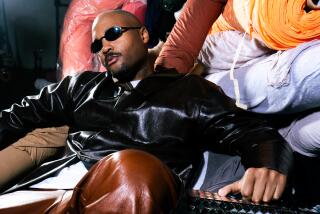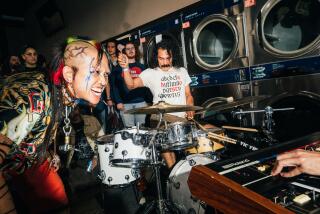Robert R. Taylor dies at 77; entrepreneur created Softsoap
With one stroke, entrepreneur Robert R. Taylor made a fortune, changed the way America washed up and doomed the bathroom soap dish to virtual obsolescence.
It was Taylor who turned hand soap from a slippery lump to a dab from a pump.
Taylor, who created Softsoap, the first mass-marketed liquid soap pumped from a plastic bottle, died of cancer Aug. 29 in Newport Beach, family members said. He was 77.
Softsoap was one of his many successful ventures, which included Obsession, a fragrance he developed with Calvin Klein and promoted in steamy ads that stimulated both sales and controversy.
But it was Taylor’s famously bold gamble on Softsoap that still is the stuff of business school case studies.
The problem, as he saw it, was that larger competitors would quickly copy his idea and sweep Softsoap off the shelves.
In 1980, the small Minnesota company he founded, Minnetonka Corp., introduced his new soap line with a $7-million ad campaign. By comparison, the yearly ad budget for Dial, the biggest soap of the day, was $8.5 million.
While the ad blitz drew consumers, “the threat of imitation was real,” wrote business professors Adam M. Brandenburger and Barry Nalebuff in their 1997 book “Co-Opetition.”
“Softsoap was hardly a patentable invention,” they noted. “Pumps had been around since Archimedes.”
In what the authors called a “bet-the-company move,” Taylor secretly ordered 100 million of the little plastic pumps that were at the time used to dispense various lotions. That tied up a full year’s production of the pumps’ only manufacturers, giving Taylor time to establish his brand without rivals. In 1987, a few years after the soap giants caught up, he sold Softsoap to Colgate-Palmolive for $61 million.
“The best way for an entrepreneur to compete in today’s marketplace,” he told the New York Times, “is to avoid competition — or at least find ways to circumvent it.”
Born in Baltimore on Sept. 1, 1935, Robert Ridgely Taylor grew up in Cincinnati and displayed a flair for business early in life. As a boy, he sold a homing pigeon to a pet store several times, family members said. After graduating from Miami University in Ohio and receiving an MBA from Stanford in 1959, he worked for Johnson & Johnson before starting his own business with a $3,000 investment in 1963.
Run at first from Taylor’s Minnesota home, Village Bath Products made hand-rolled soap balls marketed in homey glass jars and baskets. There also were fruit-scented shampoos, cocoa-butter soap designed to look like candy bars, body “paints” for kids taking baths and hundreds of other upscale variations on the workaday soap cake.
“My dad and I did all different kinds of formulations in the kitchen night after night,” Taylor’s daughter, Lori Lawrence, told the Los Angeles Times on Wednesday. When she was 7 or 8, she helped mix up batches of bath-oil-filled soap balls called Soap Puffs, squeezing them onto a cookie sheet through a pastry bag and baking them in the family oven.
“Some days they’d be too flat or they’d get too big and explode like popovers,” she said. After her nightly bath, her father would tell her: “Tomorrow’s a new day. There’s always a new formula.”
For years, Taylor marketed the soaps by jokingly fashioning himself as the “Prof. Taylor” on the soaps’ old-time labels and driving to department stores in a vintage Ford truck.
“It was normal for us to do brainstorming sessions at the dinner table, to come up with product names, to give him our evaluation of scents, consistencies and colors,” Lori Lawrence said. “We thought all families were like ours.”
Village Bath eventually became Minnetonka, which grew into a publicly held business that Taylor would promote on weekend jaunts in his hot-air balloon. Unilever bought most of the company in 1989 for $376 million.
Taylor, who founded and sold 14 consumer product businesses, acquired Calvin Klein’s failing cosmetics line for about $1 million in 1980. Although he and Klein did not get along, according to the Wall Street Journal, their signature Obsession perfume brought in $30 million in 1985, the first year it hit the stores.
Taylor bankrolled a glitzy $15-million ad campaign that hyped Obsession — “Between love and madness lies Obsession”— well before it was available. Its erotic imagery was lambasted by critics and lampooned on “Saturday Night Live” in segments that “Dad just loved,” his daughter said.
Taylor moved to California in the 1990s, buying homes in Indian Wells and Newport Beach and running his business interests from an office in Carlsbad.
In his later years, Taylor teamed with London stylist Graham Webb on hair-care products and developed the Monterey Bay Clothing Co.
In addition to Lori Lawrence, Taylor is survived by his wife, Mary Kay Taylor; daughter, Karen Brandvold; and six grandchildren. A son, David Taylor, died in a 1984 avalanche in Utah.
More to Read
Start your day right
Sign up for Essential California for the L.A. Times biggest news, features and recommendations in your inbox six days a week.
You may occasionally receive promotional content from the Los Angeles Times.







